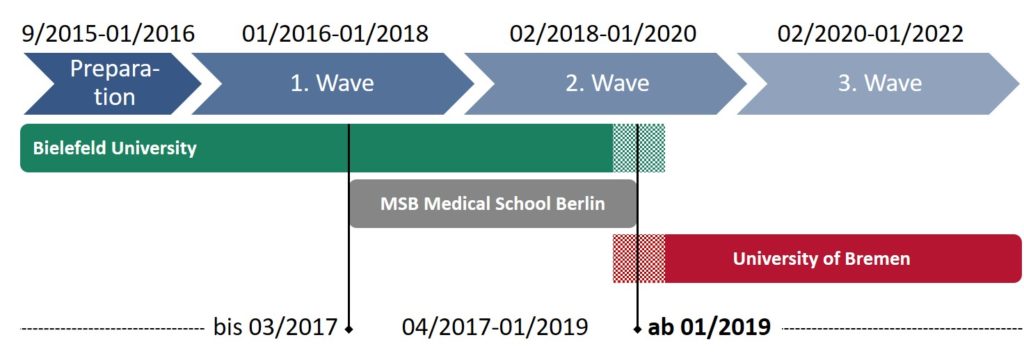General Information
SPeADy [spiːdi] is the acronym of “Study of Personality Architecture and Dynamics”, which is a longitudinal research project to explore controversial psychological questions like “What is personality?”, “What makes our thoughts, feelings and behaviour unique?“, and “To what degree are personality differences genetically or environmentally determined?”.
The main goal of the underlying studies is to deepen the knowledge of what makes individuals essentially unique and why we differ so much in our thoughts, feelings, aspirations, and behaviour. People speak of others’ “character traits“ on a daily basis: Naming one person “introverted” and another one “easygoing“. That is how we all are – when describing others – dealing with the term “Personality” as it is named in the field of differential and personality psychology. SPeADy wants to shed light on what exactly the core of this so-called “personality” is. The important findings should allow to develop a model suitable to sufficiently describe the differing personalities of human beings as truthfully as possible. Furthermore, we seek to understand the development of personality throughout the lifespan and to identify the influences of genetic and environmental factors.
The project comprises two seperate studies: The Age Groups Study and the Twin Family Study. This separation ensures the high scientific standard necessitated when trying to answer the above-mentioned questions. Both studies are conducted at the same time with a survey period of six years each. Participants fill out a questionnaire every two years (i.e., three measurement times per participant). They are asked about their personality traits, their sentiments and fields of interest, among other potentially important characteristics. We inquire about the way participants experience themselves in different contexts, their morality, fundamental values and attitudes towards a variety of topics, what their future goals are, and many other attributes along these lines.
Data is planned to be collected in three waves: 2016-2017, 2018-2019, and 2020-2021, accordingly. Our goal is to reach about 800 twins plus family members in the Twin Family Study and about 2000 individuals plus peer raters in the Age Groups Study. We capture narrow-sense personality traits (HEXACO-PI-R and BFI-2), self-related concepts (e.g., RSES, EI4, ASKU, SWLS and HSWBS), motives, goals, and interests (UMS, AI and SIT), moral foundations und values (MFQ-21 and PVQ-57-RR) as well as religiousness (Z7). In addition, we ask for major life events that were experienced between the measurement occasions. The kick-off of the research project was in autumn 2015 at Bielefeld University. Between April 2017 and the end of 2018, SPeADy was affiliated with an additional university – the MSB Medical School Berlin. Because Christian Kandler was offered a full professorship at the University of Bremen, SPeADy was located there from January 2019 to December 2023.

The Age Groups Study
The aim of the Age Groups Study is to observe the temporal changeability of various personality traits, values, motives, and other characteristics, as well as to detect those stages of life in which the most significant changes occur and, respectively, in which stages of life personality is most stable.
Each of the age groups starting with the age of 14 should encompass at least 150 participants. Additionally, two persons close to the participants are asked to rate the participants’ personality to increase the inter-subjective objectivity and validity of our data.
The third and last wave of data collection has been completed. Researchers interested in our data as Scientific Use File are welcome to contact us and to provide our filled-out Data Use Agreement and a short outline of their research plans. Please send requests and plans to: christian.kandler@uni-bielefeld.de

The Twin Family Study
The Twin Family Study aims to explore the influence of environment versus genetic constitution on personality traits.
Our goal is to reach about 400 identical and 400 fraternal twins. Parents, children and partners of those twins are interviewed as well, upon availability.
The third and last wave of data collection has been completed. Researchers interested in our data as Scientific Use File are welcome to contact us and to provide our filled-out Data Use Agreement and a short outline of their research plans. Please send requests and plans to: christian.kandler@uni-bielefeld.de

Numbers of Participants in Wave 1
Age Groups Study (participants with peer reports)*
Age 14-20: 154 Participants
Age 21-30: 384 Participants
Age 31-45: 171 Participants
Age 46-60: 316 Participants
Age 61 : 187 Participants
Twin Family Study (families with complete twin pairs)
Identical twins: 221 Families
Fraternal twins: 352 Families
Numbers of Participants in Wave 2
Age Groups Study
Age 14-20: 142 Participants
Age 21-30: 320 Participants
Age 31-45: 215 Participants
Age 46-60: 522 Participants
Age 61-94: 299 Participants
Twin Family Study (families with complete twin pairs)
Identical Twins: 207 Families
Fraternal Twins: 337 Families
Numbers of Participants in Wave 3
Age Groups Study
Age 14-20: 50 Participants
Age 21-30: 260 Participants
Age 31-45: 173 Participants
Age 46-60: 376 Participants
Age 61-94: 259 Participants
Twin Family Study (families with complete twin pairs)
Identical Twins: 186 Families
Fraternal Twins: 274 Families
*For total n please refer to the German translation of this page.
As of December 15th 2020 – Icons made by Freepik and OCHA from www.flaticon.com are licensed under CC BY 3.0



